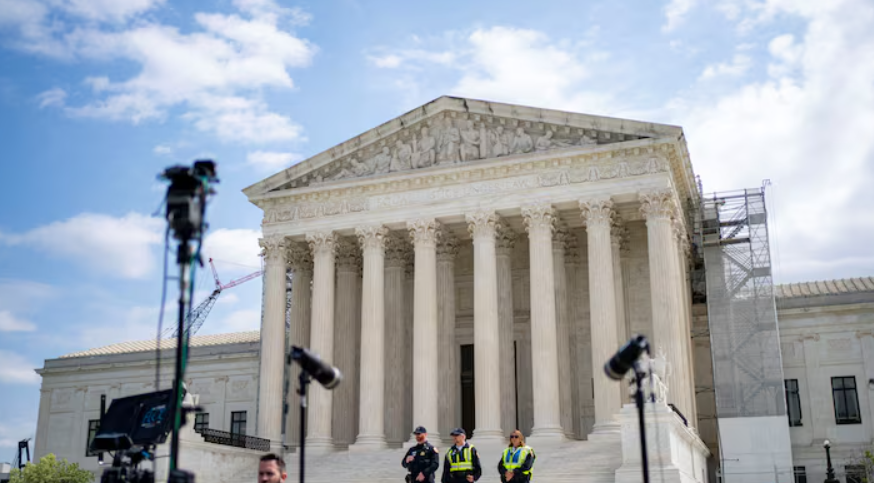WASHINGTON, April 25 (Reuters) – Arguments before the U.S. Supreme Court over Donald Trump’s claim for immunity from prosecution for his presidency produced two starkly different views of the outcome on Thursday.
Trump’s lawyer, D. John Sawyer, painted a dire picture of presidents facing “actual blackmail and extortion by their political rivals while still in office,” as the former president is seeking that immunity. . Without this, there is a risk of being prosecuted in the future.
Michael Dribben, arguing for special counsel Jack Smith, said the “blanket immunity” sought by Trump would free former presidents from criminal liability for bribery, treason, treason, murder — and here, for overturning the results. “Is plotting to use fraud to contest elections and keep itself in power.”
Justices hear arguments on Trump’s appeal after lower courts rejected his claim for presidential immunity in a criminal case brought against him by a special counsel on four charges related to efforts to overturn his 2020 election defeat . Trump is the Republican nominee to challenge Democratic President Joe Biden in the November 5 US election, unlike four years ago.
Liberal Justice Ketanji Brown Jackson noted the conflicting concerns raised by granting immunity to presidents. Without it, Jackson said, the president may be concerned about investigations, which could somewhat chill his ability to “do what he wants in office.”
“And that’s a concern on one hand,” Jackson said.
But Jackson expressed concern that the exemption would make the president “autocratic while in office.”
“The most powerful person in the world, the one with the most power, can go into office knowing there will be no possible punishment for committing a crime. I’m trying to understand why the Oval Office could be turned into a seat of criminals. Why change? This country is discouraging that activity,” Jackson told Sawyer.
Sawyer raised hypothetical scenarios involving past U.S. presidents being charged for official actions taken in office.
He asked whether George W. Bush could be prosecuted for obstruction of an official proceeding for allegedly lying to Congress to justify the Iraq War, or Barack for killing American citizens with drone strikes abroad. Obama could be charged with murder. could be imposed, or Biden could be accused of encouraging immigrants to enter illegally. country illegally, based on its border policies.
“The answer to all of these questions is no,” Sawyer said.
Sawyer said, “If a president can be charged, prosecuted, and sent to prison for his most controversial decisions as soon as he leaves office, this looming threat will distort presidential decision-making when bold.” And bold action will be needed most of all.”
Dribben tried to ease those concerns.
Dribben responded, “I think there are layered safeguards that the court could take into account that would mitigate concerns about inappropriate conduct by the president.” “This is a matter of concern to us. We are not supporting a decision that we feel would put former presidents on criminal trial without sufficient evidence, in bad faith for political animosity, and politically motivated.” Prosecution would be a violation of the Constitution.”
Conservative Justice Samuel Alito asked Sawyer whether he was requesting a “much stronger form of immunity” than is actually necessary to protect “the proper functioning of the President” – or whether something short of full immunity would suffice.
But Alito also understood Sauer’s concerns. Alito said that if an outgoing president who loses an election in a hotly contested race, as Trump did in 2020, knows he could be “criminally prosecuted by a bitter political rival — then what? This will not lead us “to a cycle that will destabilize our operations.” The country as a democracy?”
Liberal Justice Sonia Sotomayor added.
“Justice Alito went through step by step all the mechanisms that could potentially fail. In the end, if it fails completely, it is because we have destroyed our democracy on its own. Destroyed it. Destroyed it, right?” Sotomayor asked Dribben.
“It is, Justice Sotomayor,” Dribben replied.
